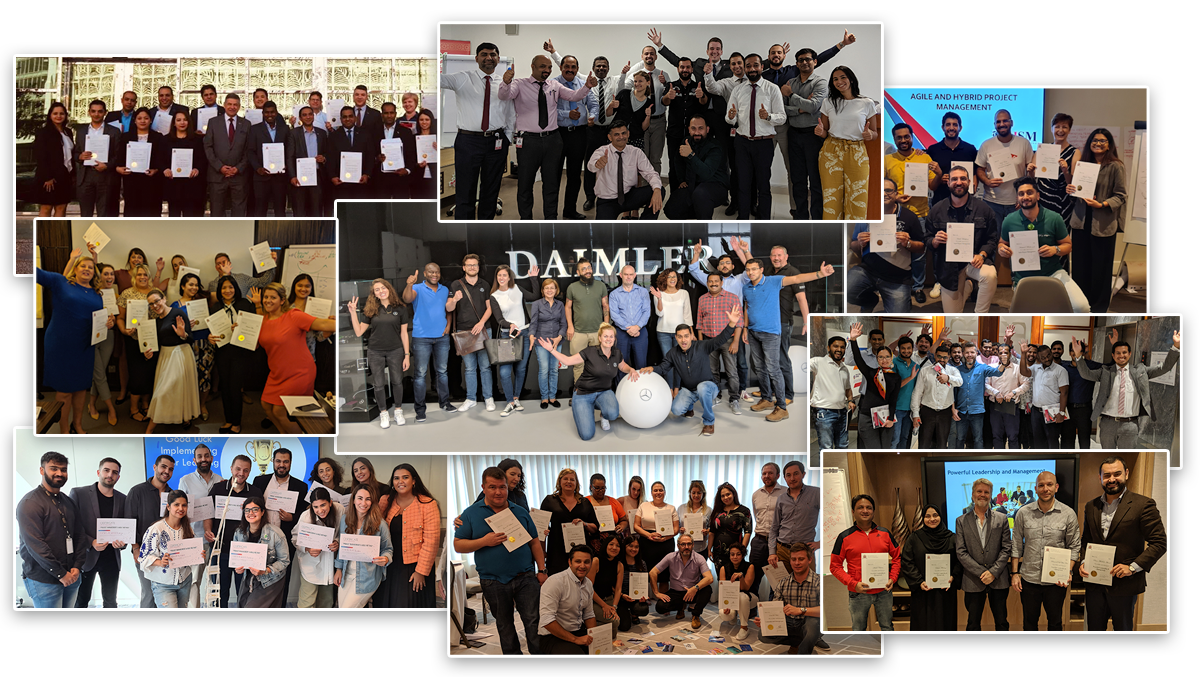Want to close more deals? Mastering the psychology behind negotiation can give you a clear edge.
Whether you are selling a product, service, or idea, understanding how people think and decide is key to negotiating with confidence and success.
This article is part of our Negotiation Skills Hub. In this guide, you will learn how to apply the psychology of sales to real-world negotiations. Discover practical questions, strategies and tips to close better deals.
Why Trust ISM Training?
Over 20,000+ graduates
Have advanced their career with ISM Training
89%
of ISM graduates say our course helped them get a promotion.
76%
said that their training helped then increase their salary.
97%
of graduates want to study more of our courses.
Our graduates are working in some of the biggest companies worldwide, companies like...






What is the art of negotiation in sales?
Sales is more than just talking — it is about the negotiation process.
The art of negotiation means finding a result that works for both sides. In sales, this could be a lower price, extra service, or faster delivery.
According to HubSpot’s 2023 sales trends report, over 50% of sales teams said their close rates stayed flat. These results show how critical negotiation skills are to moving the needle.
A successful negotiation helps both the seller and the buyer feel like they have won.
What are the key elements of negotiation?
Preparation is vital. Scotwork’s 2024 study revealed that 85% of negotiators do not recognise what the other side wants upfront. Over 80% enter negotiations without a fallback plan. These are two critical traps you can avoid with proper prep.
Before you begin any negotiation, you should understand the key parts involved:
- Interests: What does each side want?
- Options: What are other ways to meet those needs?
- Alternatives: What will you do if no agreement is reached?
- Legitimacy: Are your proposals fair and based on facts?
- Effective communication skills: Are you listening and speaking clearly?
- Relationship: How important is this long-term relationship?
- Commitment: Is everyone ready to act on the agreement?
These elements of negotiation help make sales more effective and respectful.
Start your course today!
We offer a comprehensive curriculum that covers all of the essential topics. Our experienced instructors will provide you with the support and guidance that you need to succeed.
Hard negotiation vs soft negotiation
Numerous different techniques and styles of negotiation exist. Hard negotiation and soft negotiation are two main approaches.
- Hard negotiation focuses on winning. You push for the best deal for yourself, even if the other side loses. Harvard Law School’s article outlines 10 common hard-bargaining tactics that can derail discussions. They include personal attacks and extreme demands.
- Soft negotiation is about keeping the relationship strong. You might give up more to build rapport with the parties involved.
Salespeople often need a balance. For example, a one-time deal might allow for a harder stance. Long-term clients usually need a softer, trust-building approach to negotiation.
We let our graduates do the talking...
What is a cooperative negotiation strategy?
A cooperative negotiation strategy is a win-win solution. Both the buyer and seller work together to find a solution that benefits both parties. Benefits of cooperative negotiation include:
- Encourages open communication
- Focuses on solving problems together
- Creates long-term relationships
- Resolves conflicts and builds trust
This method can lead to repeat business. In sales, cooperation often leads to better customer satisfaction and future opportunities.
Looking further ahead?
View our course calendar in full
What are common negotiation traps in sales?
Even skilled salespeople fall into negotiation traps.
These are mistakes that can damage your deal or your reputation.
Common traps in sales negotiation
- Not preparing: Know your product, your client, and your backup plan.
- Talking too much: Practice active listening. Let the client speak.
- Getting emotional: Stay calm, polite, and professional.
- Rushing the deal: Effective negotiations take time. Be patient.
- Saying yes too quickly: Don’t accept the first offer unless it meets your goals.
Avoiding these traps will help you negotiate smarter and sell more effectively.
What is a negotiated sale?
A negotiated sale is when a buyer and seller agree on price and terms through open discussion, rather than using a fixed price or auction.
Why negotiated sales matter
- Offers more flexibility for both sides
- Allows you to tailor the deal to the buyer’s needs
- Builds a more personal connection with the customer
Understanding the negotiated sale meaning helps you stay flexible and confident in high-value or complex deals.
What is a face negotiation theory in sales?
Face negotiation theory explains how people protect their public image during conflict, especially in cross-cultural conversations.
Culture affects how people talk, ask questions, or show emotion.
That’s where face negotiation theory comes in. It explains how people try to protect their “face” — their image, pride, or dignity — during conflict or tough conversations.
Key ideas from face negotiation theory
- In some cultures, people avoid saying “no” directly to save face.
- In others, people respect direct and honest feedback.
- Being too direct may seem rude in one place, but helpful in another.
When selling across cultures, knowing this theory can help you avoid misunderstandings. Acknowledging cultural differences can help you build stronger relationships.
What are good negotiation questions and answers?
Effective negotiators plan their negotiation questions and answers before talking to a buyer. Here are examples that work well in sales:
Smart questions to ask
- What matters most to this customer?
- What can I offer that adds value without hurting my bottom line?
- What will the client do if we don’t make a deal?
- Is this a one-time deal or a long-term relationship?
- What do I need, and where can I be flexible?
Answering these questions honestly helps you prepare and adapt during the conversation.
What are some simple sales negotiation tips?
Sales negotiation does not need to be hard. Here are some easy tips to remember:
Practical tips to improve
- Plan your goals and know your lowest acceptable offer.
- Use silence — people often reveal more when you pause.
- Give choices — customers like to feel in control.
- Be clear — avoid confusing words or sales jargon.
- Stay positive — your energy can influence the mood.
These techniques can boost your confidence and your success rate.
For more helpful tips, read our guide to improving negotiation skills.
Master the art of negotiation with ISM
Sales is not just about what you say — it is about how you connect, listen, and negotiate. Understanding the psychology of sales helps you avoid common negotiation traps. It also equips you with cooperative strategies, and tips to communicate with customers from any background.
Whether you are facing a tough buyer or learning the basics, improving your negotiation skills always pays off. Developing these skills will make you a more confident, effective, and respected salesperson.
ISM Dubai’s negotiation training equips you with the skills and confidence to handle high-stakes conversations. You will learn how to:
- Negotiate salaries and prices effectively to meet your goals
- Communicate with confidence in interviews and performance reviews
- Navigate difficult conversations with clarity and professionalism
- Understand the full negotiation process from preparation to closing
- Apply your skills in real-life scenarios with guidance from expert trainers
Ready to advance your career? Contact us today to learn how our Negotiation Skills training can help you negotiate with impact.
Frequently Asked Questions
A negotiated sale happens when a buyer and seller agree on the terms of a deal by talking directly. It is different from using a fixed price or auction. This kind of sale gives both sides more control and helps create a better deal that fits the buyer’s needs.
Hard negotiation is about winning. You push for the best deal, even if the other side loses.
Soft negotiation focuses on keeping the relationship strong. You may give up more to build trust.
Good negotiators often use both styles, depending on the situation and the client.
Negotiation traps are mistakes that can hurt your chances of success. These include:
- Poor planning
- Talking too much
- Getting emotional
- Rushing to close a deal
- Saying yes too soon
Avoiding these traps helps you sell more effectively, protect your reputation, and build stronger client relationships.
Face negotiation theory explains how people try to protect their self-image during tough talks.
In some cultures, people avoid saying “no” to stay polite. In others, being direct is seen as respectful.
This theory helps salespeople avoid misunderstandings and build trust across different cultures.
Good questions help you learn what the buyer wants and how flexible they are. Ask things like:
- What matters most to them?
- What will they do if there’s no deal?
- Can you add value without giving too much away?
These questions help you plan better and sell smarter.
Join 1000's of individuals and teams certified by the Institute of Sales & Marketing

Our trending courses
At ISM, we combine top-tier training courses with industry-leading instructors.
View all coursesTestimonials from Our Valued Clients
Discover the transformative experiences our clients have had with our training programs.
Hear directly from those who have unlocked their potential and achieved remarkable success.

Some other providers courses can be quite a chore! However, I felt fully engaged and excited by all the new selling tools I have...

Daniel Graham

Instead of just telling me what to do, they showed us how to do it as well as why to do it. They used real-life experiences...

Sujit Nair

The training was delivered in an easy to absorb manner and focused on all the key areas...

Paul Baker CFP



